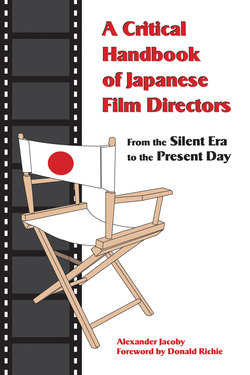Читать книгу A Critical Handbook of Japanese Film Directors - Alexander Jacoby - Страница 22
На сайте Литреса книга снята с продажи.
HARA Kazuo
Оглавление(b. June 8, 1945)
原一男
Hara’s small body of work—six features in thirty-five years—has earned him a reputation as one of the most creative and challenging Japanese documentarists. From the beginning, he tackled controversial subject matter. His remarkable debut, Goodbye CP (Sayōnara CP, 1972), focused on sufferers of cerebral palsy at a time when people with disabilities were virtually ostracized from Japanese society. Moreover, Hara probed aspects of the lives of the disabled, such as their sexuality, which even today are not often publicly acknowledged. His credo, stated in interview, is that “a documentary should explore things that people don’t want explored, bring things out of the closet, to examine why people want to hide certain things [….] These personal taboos and limitations reflect societal taboos and limitations. I want to get at just the things they don’t want to talk about, their privacy.” His second film, Extreme Private Eros: Love Song 1974 (Kyokushiteki Erosu: Renka 1974, 1974), was a frank examination of Hara’s own personal life: depicting his relationships with two women, it explored alternatives to traditional family structures and, obliquely, examined U.S.-Japan relations through its setting on Okinawa, the site of a considerable American military presence.
The goal of investigating taboos acquired more explicitly political dimensions in Hara’s most famous film, The Emperor’s Naked Army Marches On (Yuki yukite shingun, 1987), an account of the one-man crusade by war veteran Kenzō Okuzaki to expose the responsibility of the Emperor and the Japanese people for wartime atrocities. Here, Hara probed a national taboo, and showed how history is shaped or concealed by personal testimony with personal motivations. A Dedicated Life (Zenshin shōsetsuka, 1994) combined a study of a man facing death with another investigation of the fallibility of individual testimony: its subject was the cancer-stricken writer Mitsuharu Inoue, who had not only created fictions, but also fictionalized his personal history.
Despite the individuality of Hara’s style, his approach is necessarily collaborative: he has consistently allowed his subjects considerable input into the content of his documentaries, and the power of his work depends on the responses of people to the act of being filmed. He has stated that “when one is in front of the camera, one cannot help being conscious of the camera”; indeed, the sophistication of his films lies in their awareness that a situation is changed by the act of recording it. Consequently, his work seems to call into question the morality of the documentary form: the viewer watches the birth of a child in Extreme Private Eros: Love Song 1974 wanting the filmmaker to assist, or an assault by Okuzaki on an elderly man unwilling to admit his guilt in The Emperor’s Naked Army Marches On feeling that he should intervene.
Given Hara’s collaborative method, it was appropriate that he should make My Mishima (Watashi no Mishima, 1999), a study of the daily life and customs in a remote island off Western Japan, in cooperation with the members of Cinema Juku, a discussion group for young aspiring filmmakers. Hara’s most recent film, Days of Chika (Mata no hi no Chika, 2005), examined four stages in the life of a woman as seen through the eyes of four men. Though, as his first fiction feature, it marked a new departure in his work, it nevertheless sustained his abiding concern with the inescapable interrelation of the personal and the political.
1972 Sayōnara CP / Goodbye CP
1974 Kyokushiteki Erosu: Renka 1974 / Extreme Private Eros: Love Song 1974
1987 Yuki yukite shingun / The Emperor’s Naked Army Marches On
1994 Zenshin shōsetsuka / A Dedicated Life
1999 Watashi no Mishima / My Mishima (co-director)
2005 Mata no hi no Chika / Days of Chika / The Many Faces of Chika
